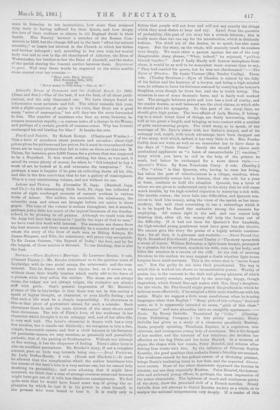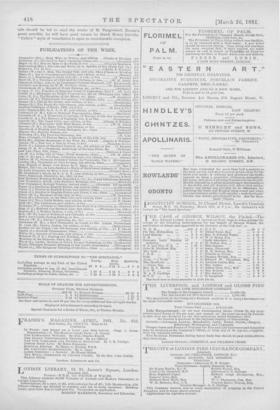NOVELS.—Flora Hepburn's Marriage. By Laurence Brooke. 3 vols. , (Samuel Tinsley.)---Mr.
Brooke introduces us to the garrison town of Leybridge, with its two social camps, the aristocratic and the com- mercial. This he draws with some vigour, but, as it Seems to us, 'without those little kindly touches which really add to the force of a picture, while they soften the outline, The moan are not always mean, the vulgar are not always vulgar, the exclusive not always Stiff with pride. One's general impression of Mr. Brooke's picture of life in Leybridge is that there was not in this society a spark of higher thought, or character, or even kindly feeling ; and that such a life must be a simple impossibility. No cleverness in this or that piece of portraiture atones for such a mistake. Such cleverness there is, and the main interest of the story shows more than cleverness. The tale of Flora's love, of the weakness in her character which brought it to-an unhappy end, and of her after-life, is very well told. The lover's character is drawn with but a very :kw touches, but it stands out distinctly ; wo recognise in him a fine, simple, honourable nature, and feel a vivid interest in his fortunes. Of particular scenes, we may mention, as genuinely and powerfully pathetic, that of the parting at Southampton. Without any attempt at fine writing, it has the eloquence of feeling. Flora's other lover is also an excellent portraiture. Mr. Brooke's story, if not a complete success, goes no little way towards being ono.—Beryl Fortesmo. By Lady Duffus-hardy. 3 vols. (Hurst and Blackott.)—It must .be allowed that the complication which the author introduces into the course of the hero's love is a very serious one, but we cannot help doubting its probability ; and even allowing that it might have occurred, we think that a man of average common-sense and firmness might have got out of it with less disastrous consequences. We feel quite sure that ho would have found some way of giving the ex- planation by which he had it in his power to clear himself, to the persons who were bound to hoar it. It is really only in fiction that people will not bear and will not say exactly the things which they most desire to hear and say. Apart from the question of probability, this part of the story has a certain interest this is really more than one can say for the introduction, which is distinctly tedious. The third act of the drama, so to speak, lies also some vigour. But the story, on the whole, will scarcely touch its readers very deeply. We must enter a protest against the use of the very disagreeable slang phrase, " What, indeed," be rejoined, "palling himself together." And if Lady Hardy will borrow metaphors from chess, it would be as well to be somewhat more correct than to say, " They had castled his queen, but he was not checkmated."—The Byres of Blendon. By Annie Thomas (Mrs. Fender Cudlip). Three vols. (Tinsley Brothers.)—Eyre of Blandon is ruined by the folly of his father and the knavery of a lawyer, and being a high-minded man, be refuses to have his fortunes restored by marrying the lawyer's daughter, even though he loves her, and she is worth loving. The situation is one of some dramatic foroo, and is fairly woll worked out. The struggle between pride and love has a look of reality, and the reader doubts, so well balanced are the rival claims, to which side he should give his sympathy. To this part of the story, then, we should give high praise. Tho love-affairs of Lady Marion, if belong. ing to a much lower level of things, are fairly interesting, though told at too great a length, and bringing us into contact with a number of quite uninteresting people. The third story, so to speak, of the marriage of Mr. Eyre's sister with her father's lawyer, and of its unhappy end, might, with much advantage, have been dropped out of the story, with which, indeed, it has very little to do. Mrs. Ponder Cudlip does not write as well as we remember her to have dono in the days of "Denis Donne." Surely she should be above such mechanical appliances as "a burst of uncontrollable [P] emotion." Irony which you have to call in the help of the printer to mark, had bettor be exchanged for a more direct style.— Queettie's Whim. By Rosa Nouchette Carey. 3 vols. (Bentley.) —The " whim " is that Queens, who, having to earn her living, has taken the post of schoolmistress in a village, resolves, when she unexpectedly comes into a fortune, that she will, for a year at least, continuo to hold the situation. Queenie, has a lover of whom we are given to understand early in the story that he will cause much trouble, by his high-minded objection to marrying a rich wife. The trouble comes ; the lover falls into difficulties, and Queenie con- trives to lend him money, using the vicar of the parish as her inter- mediary, the said vicar consenting to use a subterfuge which it is to be hoped he found due authority among the casuists for employing. All comes right iu the end, and one cannot help thinking that, after all, the money did help the lovers out of the difficulty. If it had not been for Queenio's few hundreds, the high-minded young gentleman must have gone into the Gazette. We cannot give the story the praise of a highly artistic construc- tion ; for all that, it is pleasant and rendable.—Never Found Oat. By G. Beresford Fitz-Gerald. (Samuel Tinsley.)—The story opens with a scene of horror. William Helmsley, a light-house keeper, prompted by a passion for his servant, murders his wife, cuts up her body, and hides the remains in a cavern of the cliff. At the risk of seeming frivolous to the author, we may suggest a doubt whether light-house keepers have maid-servants. This is the crime that is "never found out." But the guilty do not miss their punishment. The way in which this is worked out shows no inconsiderable power. Worthy of praise, too, is the contrast to the dark and gloomy pictures, of which the story mostly consists, supplied by the marriage, happy, though imprudent, which Gerald Borough makes with Mrs. Grey's daughter. On the whole, Mr. Fitz-Gerald might preach the goodness in which he believes more effectively, if he mingled a little more kindliness with his satire. Might we suggest a little more carefulness, when he is using languages other than English ? "Many girls of this menage," does not Moan, as it is apparently intended to moan, "girls of this class." " 8.121/4.kaaca " and uroXv 0Aotcrfito have an unsightly appearance.- Dosia. By Henry Gr6ville. Translated by " (Charing- Cross Publishing Company.)—In this pretty novelette, Henry Gr6ville has given us a study of a character peculiarly Russian. Dosia, properly speaking, Themlosia, Zaptine, is a capricious, mis- chievous, and courageous young lady of seventeen. Sho is the despair of her mother, and the torment of her relatives; she lavishes her affection on her dog Pluto and her horse Bayard. In a moment of pique, she elopes with her cousin, Peter Munrief, and returns after driving four versts with him. By the influence of Princess Sophia Koutolcy, the good qualities that underlie Dosia's frivolity are aroused. The weakness caused by her gallant rescue of a drowning peasant, brings Dosia's hesitating lover to her foot, and the expected denoue- ment occurs. None of the other characters approach the heroine in interest, nor are they especially Russian. Peter Mourief, the honour- able and awkward young officer, is, perhaps, the most impressive of the minor characters. The lightness of touch and continuous gaiety of the story, show the practised skill of a French novelist. Henry Gr6ville does not attempt to depict Russian society as a whole, or to analyse the national temperament very deeply. if a reader of this
tale should be led to read the works of M. Turgudniof, Russia's great novelist, he will have good reason to thank Henry Grdville. " Celia's" style of translation is open to considorable exception.



































 Previous page
Previous page